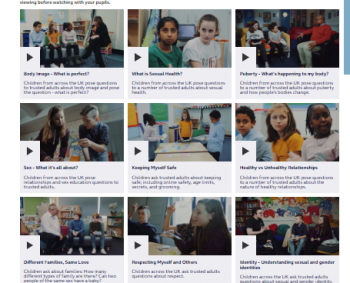BBC Teach Films – A Lovewise Response

Two weeks ago, the national press took issue with the BBC teaching children that there are more than 100 genders[1]. Today, we watched the nine films in the BBC Teach class clips series ‘RSE KS2: The Big Talk’, which was put out to support the PSHE curriculum for 9-12 year old children in schools. The general ethos was one of extreme individualism, and unashamedly child led. One of these films is where the teaching about 100 genders comes from.
In all nine films, we never heard the word ‘marriage’. ‘Husband’ was mentioned once and ‘wife’ twice, once in the context of the presenting head teacher’s same sex relationship with her wife. ‘Parents’ were only mentioned three times, once being in the context of divorce, and children were encouraged to report their anxieties to a ‘trusted adult’. The general emphasis was that children must keep themselves safe – there was no suggestion that parents should be doing that job.
The film ‘Puberty – What’s happening to my body?’ does not give children a basic explanation of the body changes involved, but centres round a discussion of periods, wet dreams and ‘boners’. In other films sex is explained as exploring your body with another person, and sexual health is ensured by knowing your partner well and using a condom (no mention of abstinence). Teachers are encouraged, in the Teacher Notes, to ask children to discuss what sex means for different sexualities.
In the film ‘Different Families, Same Love’, all kinds of family situations were mentioned except the heterosexual married family. In another film respect was defined as accepting and celebrating everyone as they are, ‘whether they like men, women or whatever’. Disrespect was mentioned as a crime which could lead to a prison sentence.
The 100+ genders are mentioned in the film entitled ‘Identity – Understanding sexual and gender identities’, and the Teacher Notes suggest setting up a classroom display of famous people of different sexualities and genders.
If you are a parent or have responsibility for children in some capacity, we suggest you watch these films, which are free to the public: https://www.bbc.co.uk/teach/class-clips-video/pshe-ks2-the-big-talk/zn8f7nb. If you hear that they will be used in your child’s school, we suggest you contact the school and raise an objection.
The films are the very antithesis of Biblical teaching. Philippians 4:8 teaches that the things that are true, honourable, just, pure, lovely, commendable, excellent and praiseworthy are the ones we should think about. We must encourage our children to do the same.
**UPDATE 11th February 2021**
In the last two weeks the above content has been withdrawn from the BBC Teach website: at least one of the videos has been ‘retired’ and the others are ‘under review’. A recent ruling in the High Court stated that children with gender dysphoria under 16 are unlikely to be able to consent to treatment with puberty blockers. In the light of this judgement there is no place for discussions of gender identity in primary schools.
In a statement the BBC has made it clear that its position on this ideology has not changed. Parents should therefore continue to be cautious about children’s content on BBC TV and online channels. Further discussion of this decision can be found in this article from Christian Today, and parents may also be interested in this post by Steve Beegoo of Christian Concern, considering a Christian response to the Relationships Education currently coming into schools.

